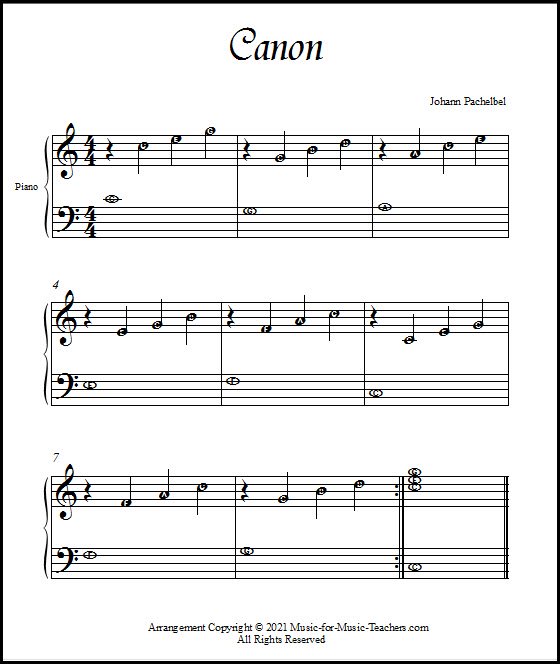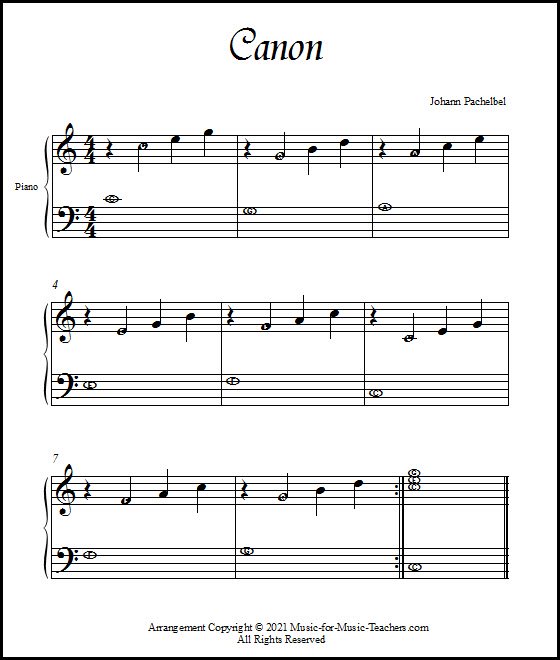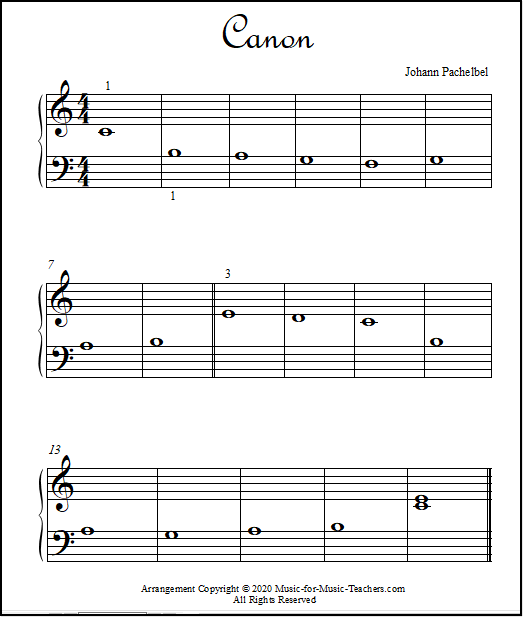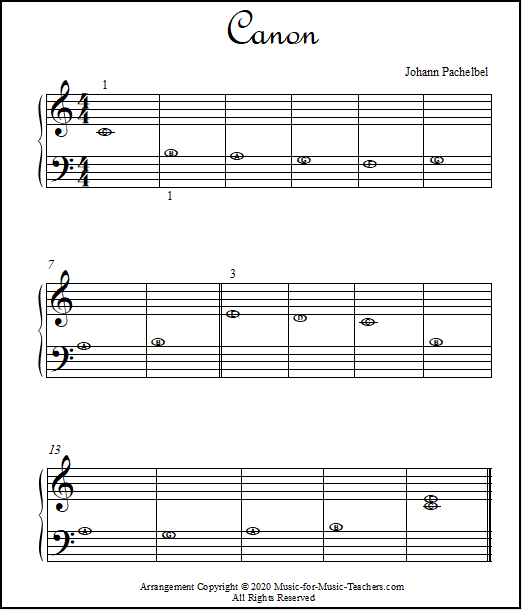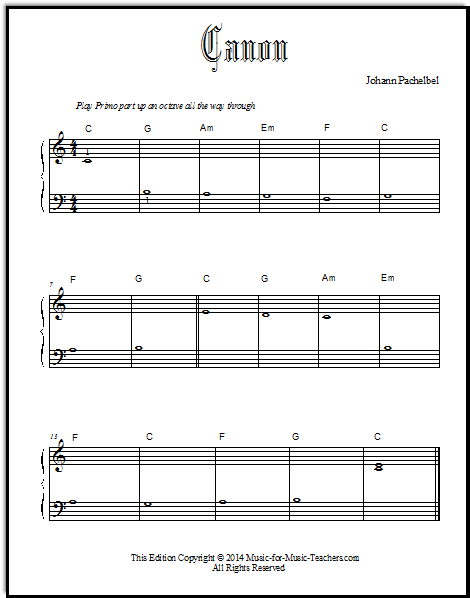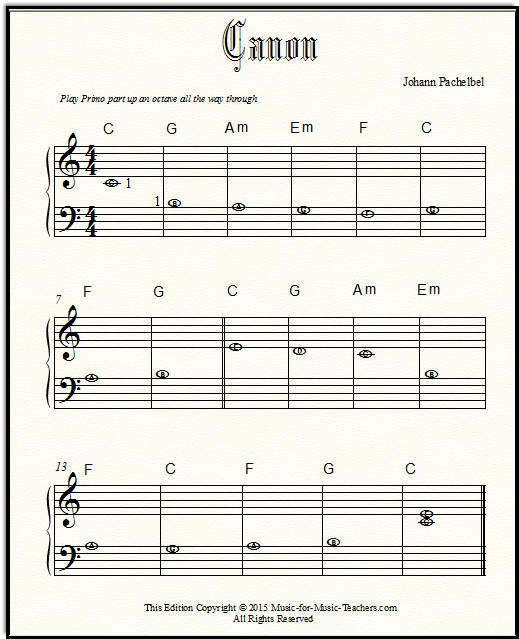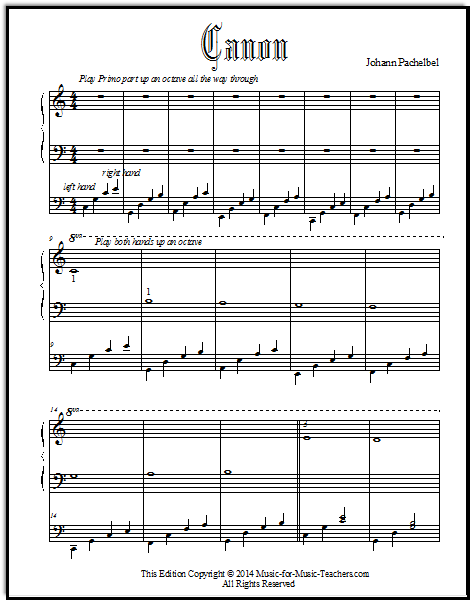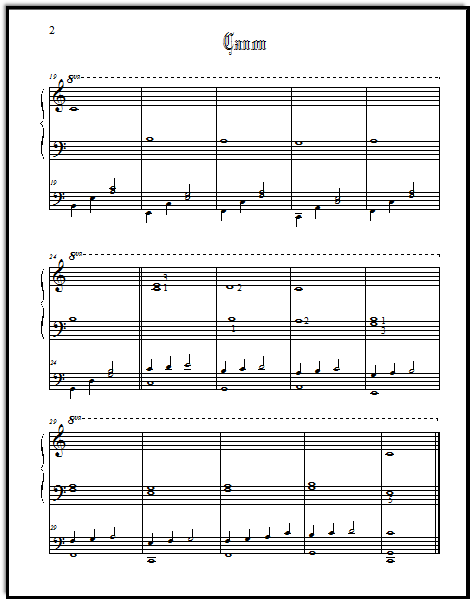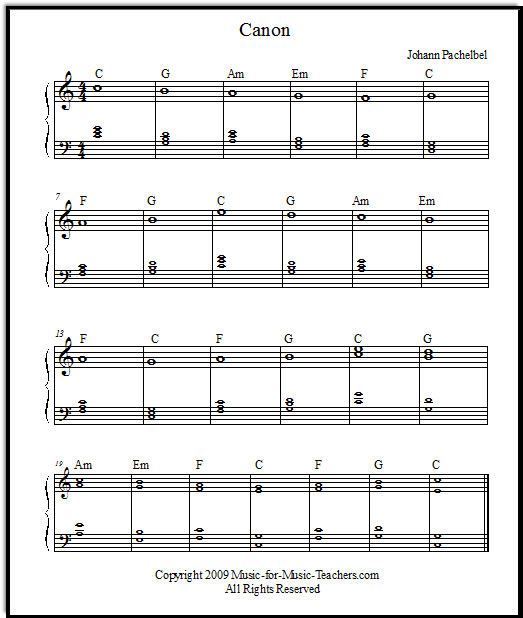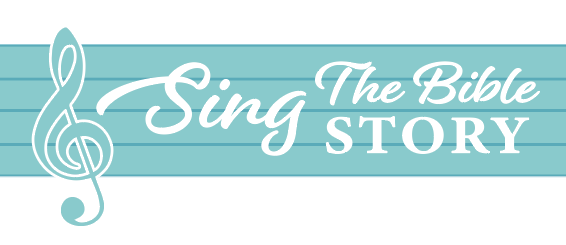Canon Sheet Music,
by Pachelbel
Canon sheet music for your beginning piano student. You won't find easier versions, I think, than the multiple arrangements on this page!
This is one of four different pages on my site featuring some version of Pachelbel's Canon in D piano sheet music.
The most successful version for beginners
Please scroll down the page for the download links.
No contest, the above piece of music is the MOST SUCCESSFUL approach to the Pachelbel Canon I have used for early beginners.
As soon as they can play broken chords and can begin to navigate their way around the bass clef even just a little, this arrangement will bring joy to their hearts!
Same arrangement, fewer named notes
Please scroll down the page for the download links.
The music above is just like the first sheet, but only the root note of the chords are lettered with AlphaNotes. I call these arrangements "AlphaNote helpers."
A Middle C version of the Canon melody
Please scroll down the page for the download links.
Here is the same arrangement, but with every note made easier with a letter inside!
Please scroll down the page for the download links.
This same arrangement is also available with only a FEW notes lettered. Scroll down the page for the sheet music downloads.
Add chords to that melody - make a duet
Now here is the same arrangement, but with chord symbols above the melody:
Please scroll down the page for the download links.
But in this arrangement, the melody creeps down into the bass clef and spends most of the time there!
Three versions here... two short ones with chord symbols (if someone should choose to play along), and a longer version with a Secondo part.
Don't confuse chord symbols with note names
Simple, eh? Even beginners will do well with this melody, as it moves step by step - a lot like Wormies - as long as they don't mix chord symbols with notes!
Though the Canon in D piano music is easy to PLAY at this beginner level, it is still a bit baffling to READ... especially with chord symbols.
Many of those chord symbols have the same names as the notes above which they are placed. Potentially very confusing, so keep that in mind as your students approach this piece!
The same arrangement, with note names
Please scroll down the page for the download links.
The Primo for a duet version, below, starts out just the same as the easy version above, but adds one more repetition or "verse", which is more challenging.
If it proves TOO challenging and your student is trying to polish this up for a recital, it is very easy with the Canon to just STOP after 8 measures, when you reach the tonic chord again (the C chord, in this piece).
That's why it used at weddings
That's one reason this piece works so well for bridesmaids walking up the aisle - you can end the piece so easily!
Fortunately, the first note of the "song" is Middle C, perhaps your student's favorite note!
In the Primo part, things start to get tricky at the end of line 2, page 2, in repetition 3 of the "canon" (the chord pattern).
Please scroll down the page for the download links.
Double thirds appear...
"OH NO! what do I do with those?" your students may be thinking.
No fingering
I left fingering out on purpose, having had so much experience with scribbling out one finger choice after another with certain stubborn students...
If they have the finger coordination, you can TRY to get them to do a double fingering such as 1&3, 2&4, 3&5...
But once they understand where the notes are going and how the notes should sound, your student is most likely to execute a "1&3, 1&3, 1&3" fingering for the whole passage.
You can CHOOSE to fight this tendency, but it may be wasted time at this level of playing!
How to read the secondo part
As for the Secondo, it is pretty easy to determine which hand plays what notes, by looking at the direction of the stems. Stems down, left hand. Stems up, right hand!
Please scroll down the page for the download links.
It is all chord work for the Secondo player.
If you take lesson time to help them figure out the chords being played, they should have good luck even if their bass-clef note-reading is still shaky.
One hand at a time, to start
I suggest splitting the hands for a week or two, with you and your student switching parts.
In other words, focus on just the Secondo, and treat it like a duet all on its own (a Right hand/left hand duet).
Your students will love playing the Pachelbel Canon like this! Duets are fun.
Learn the chord progression first
One way I love to treat the Canon is to insist kids memorize the chord pattern right away.
My favorite method is to describe how many steps the bass line moves, and which direction.
That description goes like this: "Tonic (home key), down 4, up 1, down 4, up 1, down 4, turn around 4, up 1, START OVER..." I love the pattern in this chord progression. (More accurately, you could describe the pattern as "Down a 4th, up a 2nd," etc.)
The links to the piano music sheets with easy broken chords:
Download easy broken chord arrangement with lettered notes
Download the same arrangement, with fewer lettered notes
Download the same arrangement with NO lettered notes
The links to the simple melody versions:
Download Canon Middle C arrangement, plain
Download Canon easy arrangement with AlphaNotes
Download Canon beginner arrangement with just a few "helper" notes
Download Canon sheet music for Middle C piano reader, with chord symbols to make a secondo part
Canon in D piano sheet for beginning note-readers, with chords and letters inside the note-heads
The links for the duet with written secondo part:
Download duet version of Middle C Pachelbel Canon arrangement
Are you looking for a harder arrangement?
Check out the links and graphics of all four web pages, below:
Here are the 4 different "Canon" pages on this website:
1.
Page number 1, Canon Sheet Music, features the very easiest arrangements of all, including a student-teacher duet.
Many versions, some with lettered notes.
2.
On the web page called simply "Canon," the basic melody of the Canon is paired with left hand triads, solid (as shown) and also broken.
The chord symbols are helpful for some students. But confusing for others! It is important for pianists to learn to interpret chord symbols.
3.
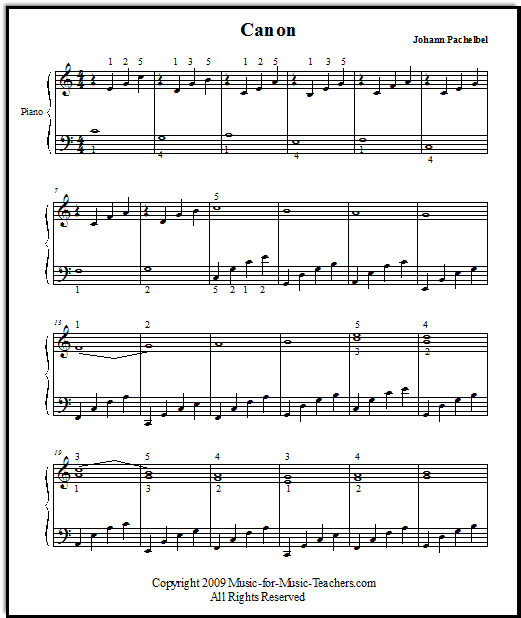
Page number 3, called "Pachelbel Canon," you will find the Canon as you are accustomed to hearing it played at weddings!
Several arrangements including the original key of D.
4.
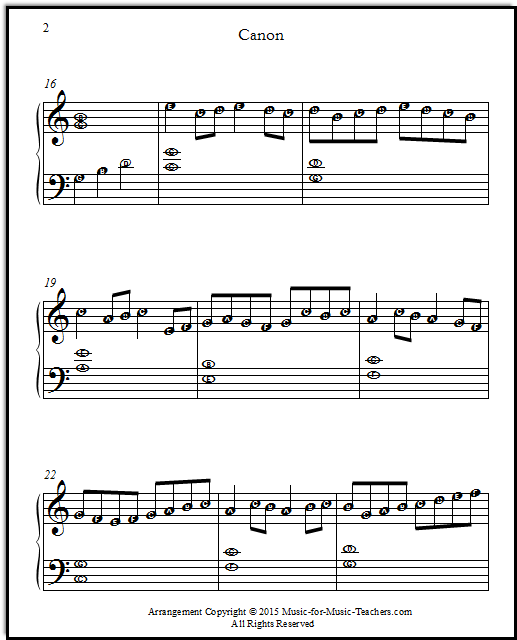
Here is the last Canon web page, called "Canon in D sheet music."
Page 2 of this arrangement is shown...
On this page of the Canon in D sheet music, you'll find ALPHANOTES (letters inside the music note-heads) in some or all of the note-heads of the music.
This arrangement was written to help an early reader conquer this piece.
It worked.
Dianna:
Your website is a light in the darkness. THANK YOU for all you do in helping to spread the love of music. It matters!
Recent Articles
-
Old Joe Clark Boogie Piano Sheet Music for Beginners
Old Joe Clark piano music for beginners is a winner! With goofy yrics, a step-wise melody, & great rhythm, it's a fun solo or duet. Bonus: it's easy to play! -
Unchained Melody Piano Sheet Music, Chords & Lyrics
Unchained Melody: an intermediate-level arrangement that captures the beauty & power of this song, in a version suited to piano. What do I mean? No triplets! -
Thank you so much for the rounds!
Hi Dana, I am just writing to thank you for the free rounds for singing -- I have put up my hand to lead folk songs and hymns for my Christian homeschool -
Teacher
I stumbled upon this site by accident, and am very glad I did. As a bumbling untrained music teacher, I like your hints about how to teach - although I -
Auld Lang Syne Sheet Music PDFs: for All Instruments & Singers!
Auld Lang Syne sheet music for New Year's Eve & other gatherings! Piano arrangements, guitar tabs, & lead sheets with chords in many keys, for all singers.
Interested in songs from the Bible for your students or church? Check out my other website, SingTheBibleStory.com!
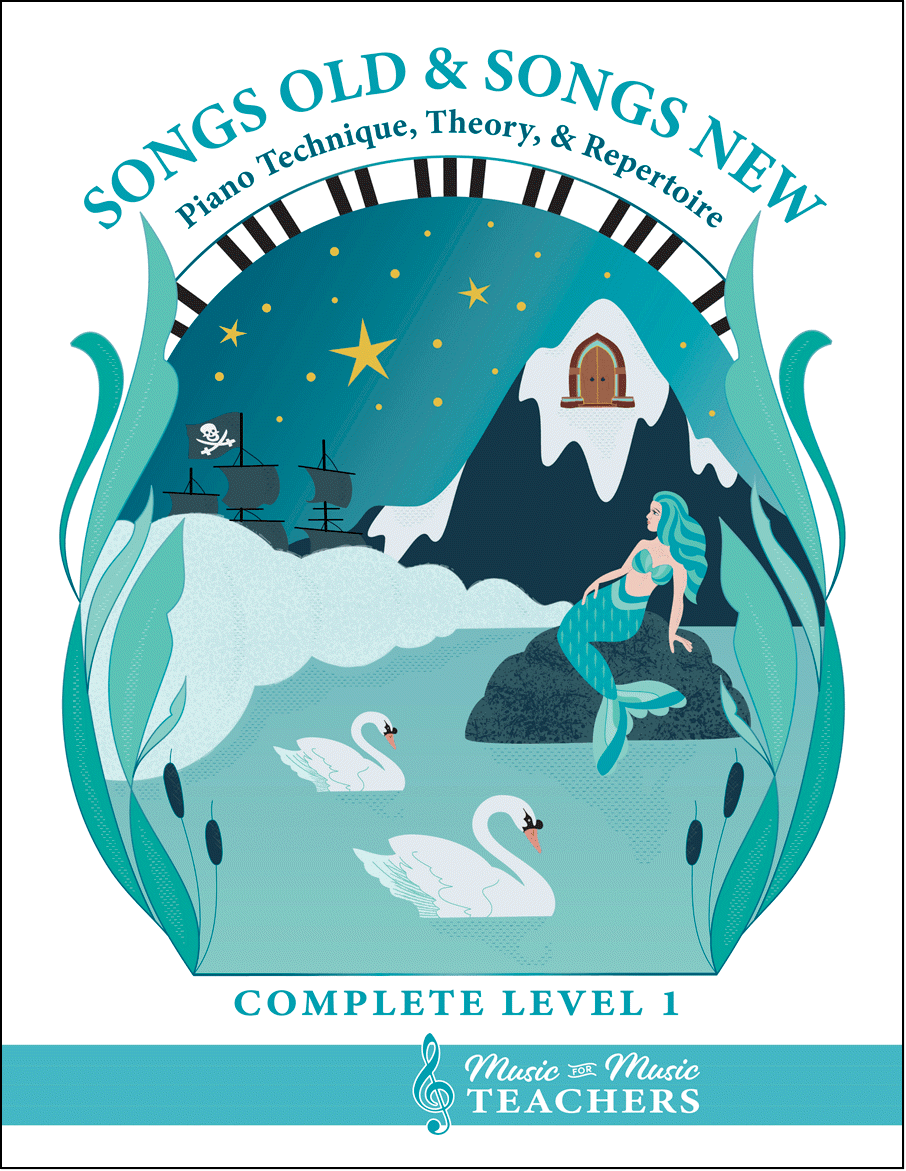
All the first-year material I give my beginner students.
Piano keyboard sheets, scales, chords, note-reading exercises, and over 256 pages of music!
Music-for-Music-Teachers.com is a participant in the Amazon Services LLC Associates Program. As an Amazon Associate I earn from qualifying purchases.
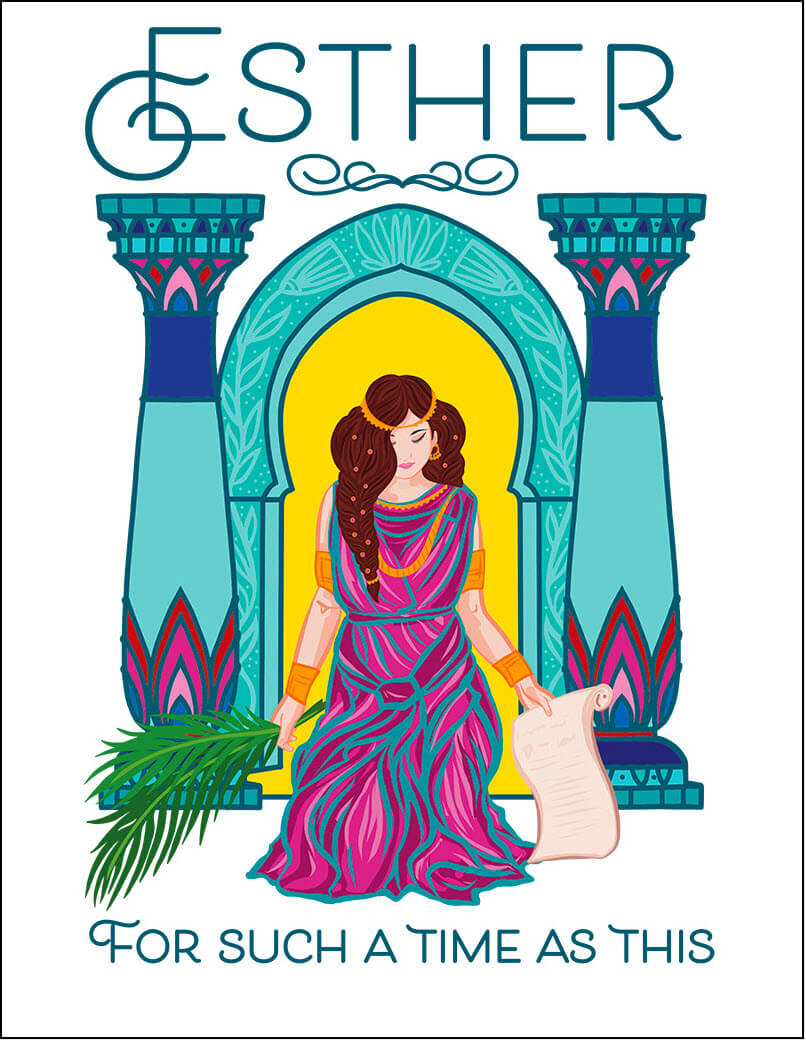
This beautiful song book for piano & voice "Esther, For Such a Time as This", available as a digital download, tells the riveting story of the time when Jews in ancient Persia faced a foe named Haman, and how a brave young queen risked her life to save her people.
A good choice for a singing story-teller, an operatic group, a short theater production, or a class of children!
This book is also available from Amazon as a paperback.
Music-for-Music-Teachers.com is a participant in the Amazon Services LLC Associates Program. As an Amazon Associate I earn from qualifying purchases.
This book is available as a digital download from this site. Visit this page to see some free examples from the book.
It is also available from Amazon as a paperback!
This is the perfect easy start for little pianists.
And when they start reading white-key notes on the staff, this is a fun easy resource to say each week, "Choose a new black-key song at home this week and figure it out to show me next lesson!" They will be spending more time at the piano.
Music-for-Music-Teachers.com is a participant in the Amazon Services LLC Associates Program. As an Amazon Associate I earn from qualifying purchases.
A perfect read aloud storybook
for little boys or girls.
The Adventures of Tonsta highlight the travels of a very young boy with a good heart, who goes about helping folk in trouble.
With a red cap on his head and a sack of tools slung over his shoulder, Tonsta seems to meet people in distress wherever he goes.
Lots of trolls in this book - including one who gives him a Christmas gift!
Music-for-Music-Teachers.com is a participant in the Amazon Services LLC Associates Program. As an Amazon Associate I earn from qualifying purchases.
Comments: Do you have a story or a question about music teaching? Share it!
Please note that all comments are moderated, and will not appear until I have approved them. Also, IF YOU ARE ASKING FOR MUSIC THAT IS NOT IN THE PUBLIC DOMAIN, YOUR REQUEST WILL BE IGNORED. That's pretty much any music written in the last 75 years...
What Other Visitors Have Said
Click below to see contributions from other visitors to this page...
BRAND NEW to Music... What is that letter symbol above the notes? Not rated yet
I am BRAND NEW to music so I have some questions on the very basics. On your beginner sheet of Canon in D, there are letters above the ledger. What …
About the Author

Hi, I'm Dana! (Say that like "Anna".) I'm the owner of Music-for-Music-Teachers.com, and a newer site, SingTheBibleStory.com.
Like some of you, I've been playing the piano since early childhood, and have added a few other instruments along the way, plus an interest in arranging and composing music.
You can find out more about me and the reason for this website at my About Me page.
